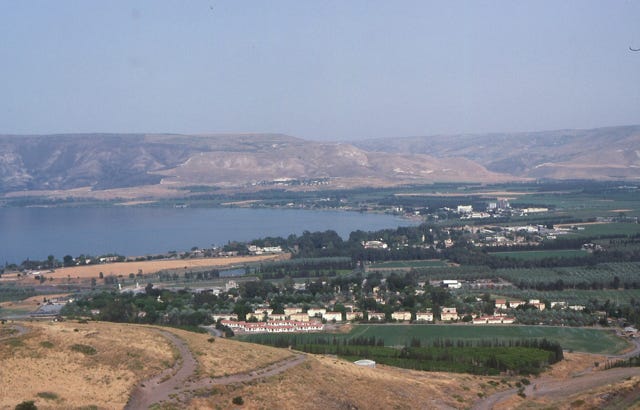Sea of Galilee: Holy Land Picture #2

This is the southern end of the Sea of Galilee where the sea flows into the Jordan River. The Sea of Galilee is an important geographical feature of the Holy Land because it is a freshwater lake, and fresh water is a scarce commodity in an arid region like the Holy Land. The scarcity of water in this region is evident in the photo by looking at the desert mountains in the background. The value of the Sea of Galilee is evident by looking at the fertile agriculture in the right foreground. All that agriculture depends on water from the Sea of Galilee.
Previous Picture: The Banias Waterfall
Importance of the Sea of Galilee
[widgets_on_pages id="ProductOne"]The Sea of Galilee is also important because it, the Jordan River, and the Dead Sea form a natural defensible border. Bodies of water are natural barriers that deter and hinder travel. Steep hills also deter and hinder travel. I stood on a steep hill on the west side of the Jordan Valley to take this picture. On the other side of the sea is a steep hill forming the east side of the Jordan Valley. In between is the Sea of Galilee on the left and the Jordan River on the right (the Jordan River cannot be seen in this picture, but it is there). Any person or army wishing to cross this valley needs to navigate both the water barrier and the steep hills that form the sides of the valley.
Despite the value and importance of the Sea of Galilee, the sea is rarely mentioned in Bible history. Yes, the sea was very prominent in the life of Jesus, but that was only three short years of Bible history. The Sea of Galilee is rarely mentioned in the Old Testament which covers the 4,000 years of history before Christ, nor is it mentioned in the portions of the New Testament which tell us what happened in the decades after the death, burial, and resurrection of Jesus.
Influence of the Sea of Galilee
[widgets_on_pages id="ProductTwo"]However, even though the Sea of Galilee was rarely mentioned in the story of the Bible, the sea had a strong influence on Bible history. For example:
Genesis 32 makes reference to Jacob crossing the Jordan River as he traveled to and from his mother's homeland. The Jordan River was a barrier, but Jacob crossed the Jordan anyway because the Sea of Galilee was to the north, and crossing the Jordan was easier than crossing the sea or going around it.
Numbers 32 tells us two and a half tribes of Israel settled east of the Jordan River instead of crossing over the Jordan River and settling in the promised land. Those two and a half tribes were always separated from the rest of the tribes of Israel and the Sea of Galilee was part of the barrier that divided those two and a half tribes from the rest of the tribes.
Joshua 3 tells us the Jordan River was a barrier between the Israelites and the promised land (the Jordan was overflowing its banks). They had no choice but to cross the Jordan anyway because the Sea of Galilee was to the north and the Dead Sea was to the south, and those bodies of water were even more formidable than the overflowing Jordan River.
Judges 3 tells us the Israelites won a great battle against the Moabites because the Israelites seized the fords of the Jordan. With the Sea of Galilee to the north and the Dead Sea to the south, the only way for the Moabites to cross the Jordan was at the fords, and when the Israelites captured the fords, the Moabites were trapped on the Israelite side of the Jordan.
[widgets_on_pages id="ProductThree"]There are at least 64 verses in the Old Testament which mention the task of crossing the Jordan River. The Jordan River was a formidable barrier, but travelers crossed it anyway because crossing the Jordan was easier than crossing the Sea of Galilee or going around the Sea of Galilee. And so even though the Sea of Galilee is rarely mentioned in the Old Testament, the existence of the sea had a strong influence on Biblical events.
Previous Picture: The Banias Waterfall
“Scripture quotations taken from the NASB."
Would you like to be notified when new posts are published?
[widgets_on_pages id="Follow"]
